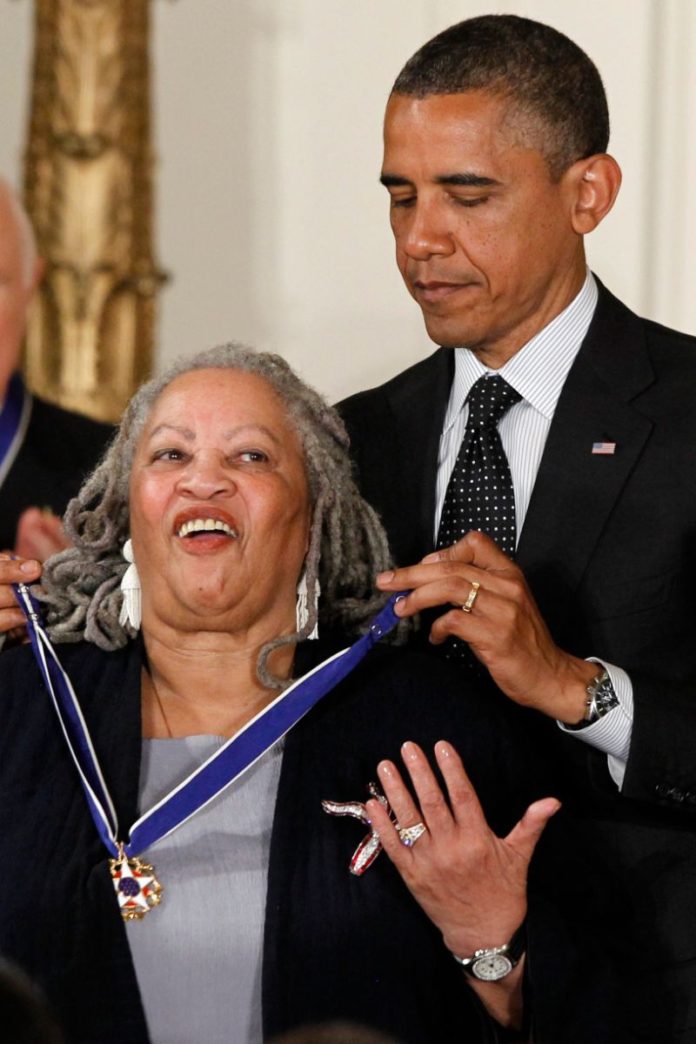Toni Morrison, the first African American woman to win the Nobel Prize for Literature, is gone. But her unique voice – earthy, poetic, powerful, elliptical – endures in novels like “Beloved, “Song of Solomon,” “Sula” and “The Bluest Eye.”
She died Monday at age 88 in New York following a short illness, according to her family and publisher.
The Morrison family issued this statement via Morrison’s publisher: “It is with profound sadness we share that, following a short illness, our adored mother and grandmother, Toni Morrison, passed away peacefully last night surrounded by family and friends. She was an extremely devoted mother, grandmother, and aunt who reveled in being with her family and friends. The consummate writer who treasured the written word, whether her own, her students or others, she read voraciously and was most at home when writing. Although her passing represents a tremendous loss, we are grateful she had a long, well lived life.”
Paul Bogaards, EVP and director of communications of Knopf Doubleday, said Morrison died at Montefiore Medical Center in New York.
Her books gave expression to formerly unspoken truths of black life in America, past and present. Morrison may be best remembered as a literary genius who wrote about black people for other black people, yet her work had universal appeal.
In their 1993 announcement, the Nobel Prize committee noted that Morrison “in novels characterized by visionary force and poetic import, gives life to an essential aspect of American reality.”
In 2012, Morrison was awarded the Presidential Medal of Freedom by President Obama. It is the highest civilian honor in the United States.
In addition to her many literary prizes – the Pulitzer, the Nobel, the National Book Critics Circle – Morrison’s books were best-sellers. She became familiar to millions of fans thanks to the efforts of her close friend, Oprah Winfrey. The cultural goddess featured Morrison and her novels on her television book club.
Winfrey also produced the 1998 film version of “Beloved” and starred in the movie, along with Danny Glover, Thandie Newton and Kimberly Elise. Jonathan Demme directed.
The book explored the agony of slavery and how the experience could force a mother to kill her own child rather than let the child be returned to a life of slavery.
On TV and in person, Morrison radiated a queenly presence, accented by her thick gray dreadlocks, watchful eyes and regal, almost haughty, bearing.
Toni Morrison was born in Lorain, Ohio, on Feb. 18, 1931, the daughter of a welder and a homemaker, the second of four children. She often noted in later interviews her regret at not keeping her original name: Chloe Anthony Wofford.
She changed her name to Toni while studying at Howard University in Washington, D.C. because Toni was easier for other people to pronounce. Morrison was the surname of her ex-husband, a Jamaican architect whom she divorced in 1964 after six years of marriage.
A small Midwestern industrial town on the banks of Lake Erie, Lorain has provided the setting for some of Morrison’s novels. Ohio, Morrison said, was “neither plantation nor ghetto.”
Lorain was a gritty, working class town. Morrison’s father had no time for whites, “distrusting every word and every gesture of every white man on earth,” she recalled. The future Nobel laureate made extra money doing housework for white families.
But the job that changed her life was helping her older sister at the public library. At age 14, Morrison became a fanatical reader inhaling the classics, from Austen to Joyce to Tolstoy. After high school, Morrison attended Howard, graduating in 1953, and later Cornell, in Ithaca, N.Y., where she received her masters in English literature in 1955. She wrote her thesis on how William Faulkner and Virginia Woolf used the theme of suicide in their work.
Morrison returned to teach at Howard (black activist Stokely Carmichael was one of her students). She was pregnant with her second son when her marriage ended in 1964.
Morrison eventually became a book editor in New York City. From 1965 to 1985, she worked at Random House where she shepherded many notable books by African- Americans into print. Her authors included Angela Davis, Toni Cade Bambara and Muhammad Ali.
In 1974, she edited the influential and eclectic “Black Book” which presented a historical scrapbook of African-American life
Morrison began writing fiction during her marriage but did not publish her first novel, “The Bluest Eye,” until 1970. The story revolves around a young black girl named Pecola Breedlove. Raped by her father, Pecola is eventually driven mad by her desire to become like Shirley Temple, the adored white child star. Stark in its pain and anguish, the novel brought forth the suppressed fury and harm wrought by racism.
Morrison followed with the acclaimed “Sula.” The 1973 tale explored the complicated relationship between two black women growing up in The Bottom, a rough area of a Midwestern town. In “Sula,” certain themes emerged that have continued to mark Morrison’s work. They include black folklore elements, such as the supernatural. Morrison drew upon her family’s oral tradition: Her grandparents were originally from the south and her father was a gifted storyteller.
It was in her third novel, 1977’s “Song of Solomon,” that Morrison really established her standing among contemporary writers. The story explored the life of an African-American man looking to find his place in the world. Magical elements brought comparisons to Gabriel Garcia Marquez.
It was also the first novel by an African-American writer to be chosen as a Book-of-the Month Club selection since Richard Wright’s 1940 “Native Son.” Reviewing the book, novelist Anne Tyler wrote, “I would call the book poetry, but that would seem to be denying its considerable power as a story.” Black folklore also played a part in Morrison’s 1981 novel “Tar Baby,” set in the Caribbean.
One of most important aspects of Morrison’s writing was her decision to write about the lives of black people for a black readership. When discussing Ralph Ellison’s masterpiece, “Invisible Man,” Morrison often commented, “invisible to whom?” She felt that the sense of a “white gaze” looking at black writing hindered creativity and honesty.
She felt that being a black and a woman were not hindrances but rather gave her writing depth and perspective. She told one interviewer, “I really think that the range of emotions and perceptions I have had access to as a black person and a female person are greater than those of people who are neither … My world did not shrink because I was a black female writer. It just got bigger.”
Many consider “Beloved,” published in 1987, to be Morrison’s masterpiece. Critically praised and a best-seller, it stirred a literary firestorm when Morrison did not win the National Book Award (“Paris Trout” by Pete Dexter won instead).
A group of 48 prominent African-American writers and scholars wrote a public letter decrying the judges’ decision. Among the signers: Alice Walker and Maya Angelou. Morrison did win the Pulitzer for “Beloved.”
Morrison followed “Beloved” with a trilogy of novels about destructive human emotions: “Jazz,” “Paradise” and “Love.”
In the later years in her career, the writer headed in a new direction: She and her younger son, Slade Morrison, an artist, collaborated on a series of children’s books. (Slade died of pancreatic cancer in 2010.)
Morrison continued to write and publish into her 80s. “Home” (2012), about a black Korean War vet battling racism once he returns home, and the novella “God Help the Child” (2015), the story of a young woman ashamed of her dark skin. In a review for USA TODAY, Charles Finch wrote: ” ‘God Save the Child’ is superb, its story gliding along the tracks of Morrison’s utterly assured prose.”
But in the end, Morrison will be remembered most for the task she set herself: “My work requires me to think about how free I can be as an African-American woman writer in my genderized, sexualized, wholly racialized world.”
Morrison wrote these words in her book of essays, “Playing in the Dark: Whiteness and the Literary Imagination” (1992). And she added, “My project rises from delight, not disappointment.”
- USA TODAY














